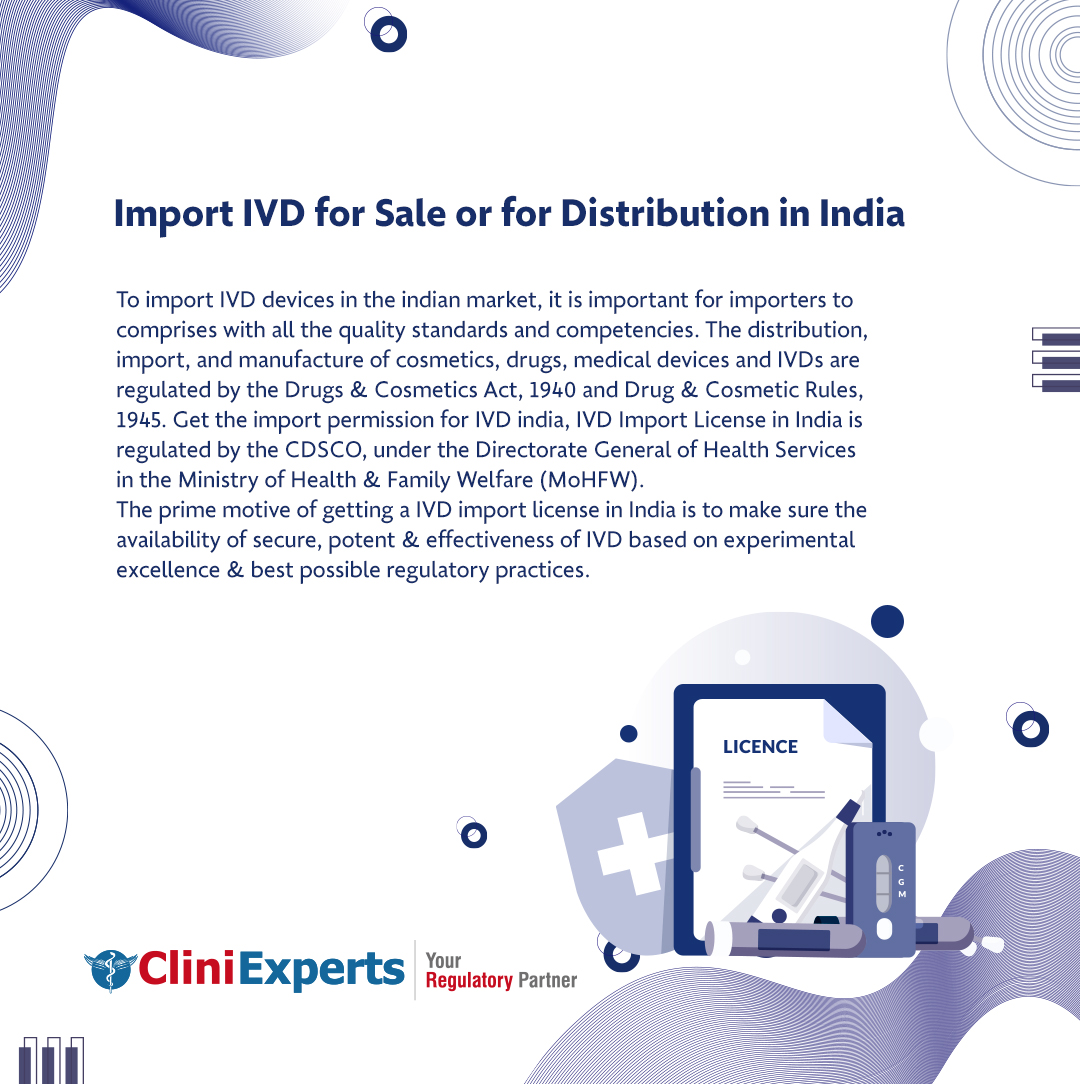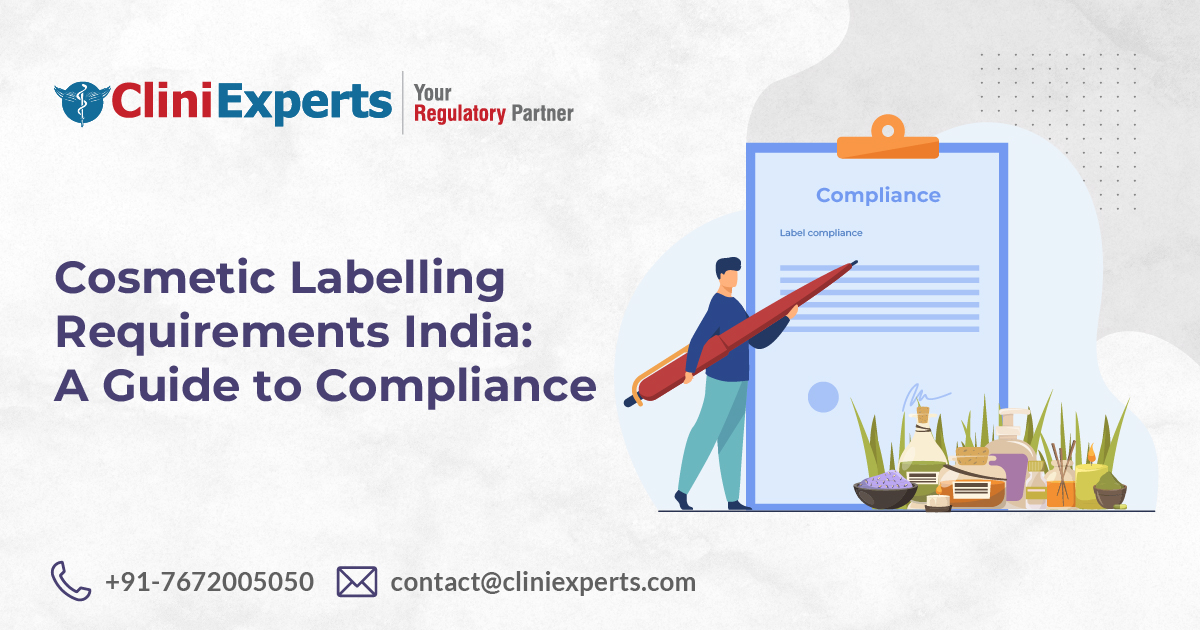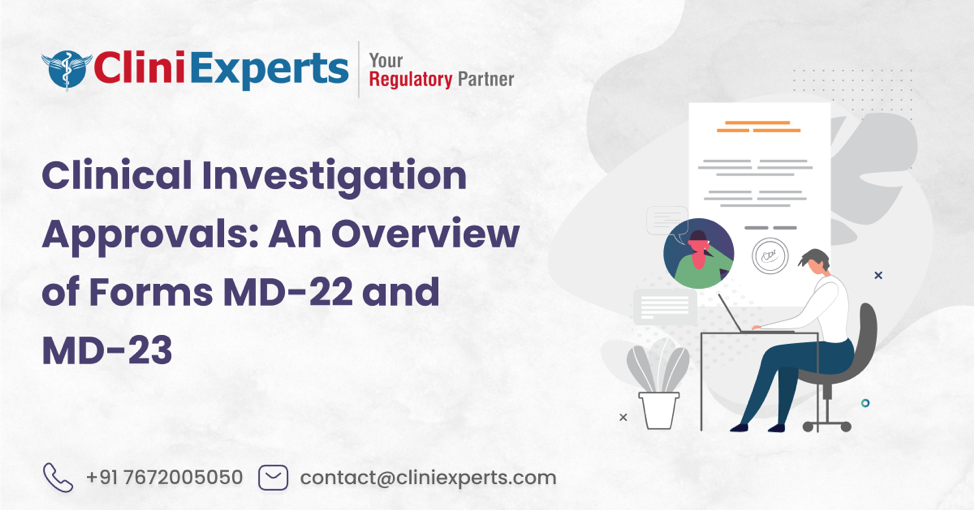Import In-vitro Diagnostic Medical Devices for Sale or for Distribution in India

To import IVD devices in the indian market, it is important for importers to comprises with all the quality standards and competencies. The distribution, import, and manufacture of cosmetics, drugs, medical devices and IVDs are regulated by the Drugs & Cosmetics Act, 1940 and Drug & Cosmetic Rules, 1945. Get the import permission for IVD india, IVD Import License in India is regulated by the CDSCO, under the Directorate General of Health Services in the Ministry of Health & Family Welfare (MoHFW).
The prime motive of getting a IVD import license in India is to make sure the availability of secure, potent & effectiveness of IVD based on experimental excellence & best possible regulatory practices.
IVD Classification
IVD has classified in rule-based classification system that consists four risk classes A, B, C, D.
- (i) low risk – Class A – low individual & low public risk.
- (ii) low to moderate risk – Class B – moderate individual and low public risk.
- (iii) moderate to high risk – Class C – high individual and moderate public risk.
- (iv) high risk – Class D – high individual and high public risk.
Both class A and B In-vitro diagnostic kits are considered to be of low- and moderate-risk. All Class A, B, C and D IVD’s Import license are submitted to the CLA and license are issued by the CLA.
Test Licence To Import IVD For Test, Evaluation, Clinical Investigations
Any in vitro diagnostic medical device may be imported to perform clinical investigations, tests, evaluations, demonstrations, or training can apply for test license to import IVD.
Under the new medical device rules, 2017, an applicant can submit form MD-16 if they intend to import small quantities of In Vitro Diagnostic Kits along with the required documents, the Central Licensing Authority receives the application. This permission of test license to import IVD is provided in MD Form 17 by the Central Licensing Authority.
Alternatively, rejections of applications for reasons must be made in writing within thirty days after the date of application under sub-section (2) of rule 40.
A Form MD-17 IVD test license shall remain in effect for a period of three years from its date of issue, unless cancelled prior to expiry.
Grant Of Test Licence For Import For Test, Evaluation, Clinical Investigations, Etc. (Form MD 17)
- The Central Licensing Authority may issue a test licence in MD-17 to applicants who are satisfied they have met the requirements of these regulations. Alternatively, rejections of applications for reasons must be made in writing within thirty days after the date of application under sub-section (2) of rule 40.
- A medical device that has received a test license under sub-rule (1) may only be used for clinical investigation, test evaluation, demonstration, or training. Such clinical investigations, tests or evaluations or training shall take place at the location specified in such test license:
Except as provided in this paragraph, the Central Licensing Authority is notified in writing in all cases where the medical equipment must be taken to places other than those specified in the test licensing. - The test license holder must keep a record of all activities, including the manufacturer’s name, the quantity imported and the date of import.
- An invoice or statement describing the details of each medical device and its quantity must be included with every consignment.
- A Form MD-17 license shall, unless cancelled before, remain in effect for a period of three years from its date of issue.
- Medical devices that aren’t being used, such as in vitro diagnostics and medical devices, may be allowed to be exported to or destroyed upon notification to the Central Licensing Authority.
- If any licensee in violation of sub-rule (1) violates any provision of these regulations, the Central Licensing Authority shall issue a show cause notice asking the licensee why the order should not be made for the cancellation.
- The Central Licensing Authority shall, after giving licensees an opportunity to respond in writing to their defence, issue an order to cancel or amend the licence and record the reasons for the cancellation in the order.
- A person whose license has been cancelled by sub-rule (8) may appeal to the Central Government within 45 days after the date of such an order.
Permission to import or manufacture new in vitro diagnostic medical device.
An application for grant of permission to import or manufacture a new in vitro diagnostic medical device may be made to the Central Licensing Authority in Form MD-28 either by an authorised agent in case of import or a manufacturer himself, as the case may be, and shall be accompanied with fee as specified in the Second Schedule along with information specified in Part IV of the Fourth Schedule
Suppose the new in-vitro diagnostic medical tool is used for the diagnosis of life-threatening. In that case, severe diseases or diseases of particular relevance for the Indian health situation, national emergencies, extreme urgency, epidemics and diagnostic medical instruments used for diagnosis, conditions, diseases for which no diagnostic medical device exists in the country, the Central Licensing Authority may abbreviate or defer the requirements.
It is further agreed that data on clinical performance evaluation of new in vitro diagnostic medical equipment classified under Class B may not be required, except where the Central Licensing Authority, for reasons being recorded in writing, considers it necessary depending on the nature and use of the medical device.
(2) The Central Licensing Authority will, upon receipt of information and application under sub-rule (1), may either grant permission to manufacture or import new in vitro diagnostic surgical devices in Form MD-29. Or it may reject the request for reasons that must be recorded in writing within a period of up to ninety days or any extended period not exceeding thirty days after the date of application.
It is agreed that the Central Licensing Authority will, in the event of insufficient information in relation to sub-rule (1). In such cases, the Central Licensing Authority will inform the applicant by writing within the stated period. Reasons to be recorded in writing. There are conditions that must be met before granting permission:
It is further provided that if the applicant fails or refuses to provide the Central Licensing Authority with the required information within ninety (90) days of the date on which it was intimated, and the Authority considers that the requested information was not possible to be furnished within this time period, the Authority will reject the application and record the reasons for rejection in writing.
Permission to conduct clinical performance evaluation for new in vitro diagnostic medical device (Form MD 24 /Form MD 25)
- Any person, sponsor, or organization shall not conduct any clinical performance assessment in relation to a new in vitro diagnostic medical device on any specimen consisting of blood or tissue acquired from the human body except as permitted by the Central Licensing Authority, subject to the conditions and in the manner specified in these rules.
- An application to get the grant of permission to conduct a clinical performance evaluation of a new in vitro diagnostic medical device shall be made to the Central Licensing Authority in Form MD-24 by the sponsor. It shall be accompanied by a fee as specified in the Second Schedule, along with information specified in sub-rule (3) duly signed by the sponsor in India:
Hospitals, organisations, and institutes not affiliated with the Central Government or State Governments are not required to pay any fee to conduct clinical performance evaluations of new in vitro medical devices. - The information required under sub-rule (2) shall consist of the following, namely,-
- Approval from an Ethics Committee registered with Central Licensing Authority as per Appendix VIII of Schedule Y of the Drugs and Cosmetics Rules, 1945 and referred to in the Seventh Schedule.
- The source and quantity of samples that shall be used in the evaluation.
- device description including specification for raw material and finished products, data that allows identification of the device in issue, proposed instruction, labels and regulatory status within other countries, if necessary;
- In-house performance evaluation data used for establishing stability, specificity and sensitivity, repeatability, reproducibility, and repeatability.
- A clinical performance evaluation plan is outlining in particular the objective, scientific, medical or technical grounds and scope of the evaluation.
- Case Report Form as described in Table 6 on the Seventh Schedule.
- undertaking of investigators according to Table 9 in the Seventh Schedule.
- The list of participating laboratories or institutions in the evaluation study.
- The duration of the evaluation. In the case of devices for self-testing, the location, number and gender of those involved.
- An undertaking that the device in issue conforms to an obligation of these rules, except for aspects covered by evaluation, and apart from those precisely itemised in the undertaking, that all precautions have been taken to ensure the safety and health of the user, patient, and others.
- Performance evaluation report from the laboratory that was designated under sub-rule (1) of rule 19.
- The Central Licensing Authority has the power to abbreviate and defer or waive clinical performance evaluation requirements in the public interest. Reasons for this can be recorded in writing to grant permission for clinical performance evaluation.
- If the Central Licensing Authority, after any further inquiry, if any, as may be deliberated essential, is contended that the necessities of these rules have been adhered to, may grant a license to perform clinical performance evaluation for a new in vitro diagnostic medical device in Form MD-25 or may reject the application for reasons recorded in writing within ninety days period from the date of application.
Application To Get The Grant Of Import IVD Licence (Form MD-14)
- An authorised agent who has permission to manufacture for sale or distribution or wholesale licence for sale or distribution IVD under these rules shall apply to the Central Licensing Authority for an import licence of IVD medical device. This application must be made through the identified online portal of the Ministry of Health and Family Welfare within the Central Government in Form MD-14 to get a license.
- The application under sub-rule (1) shall be accompanied by the fee specified in the Second Schedule with specified documents specified in the Fourth Schedule:
It is provided that the Central Licensing Authority is informed in writing of any modification to the documents submitted during the application process and before the grant of a license. - Where the Central Licensing Authority suspects that the quality of a medical device may be compromised and decides that it should be subject to evaluation or test, or examination, the authorised agent shall pay a fee to the Central Licensing Authority to have a such evaluation, tests or examination done at the laboratory specified by them.
Grant Of Import Licence Form MD-15
- The Central Licensing Authority shall examine all documents submitted with the application as per sub-rule (1). Based on an inspection report, if the Central Licensing Authority is satisfied, it may issue a licence in form MD-15. Reasons for rejecting such application must be documented in writing within nine months from the date of application.
- In the case of rejection, the applicant has the right to appeal to Central Government within forty-five days. This Government may, after a such inquiry into the matter that is considered necessary, issue orders in respect thereof within ninety days from the date of appeal.
- When a free sale certificate for any in-vitro diagnostic medical device is already issued by any of the national regulatory authorities or other competent authorities of any of the countries, namely Australia, Canada, Japan, European Union Countries or America, a license under sub-rule (1) shall be granted to an applicant without conducting a clinical investigation.
- Where an in-vitro diagnostic medical device is imported from countries other than those mentioned in sub-rule (3), the license in case of Class C and Class D IVDs may be granted after its safety and effectiveness have been proven through clinical investigation in India, as per Chapter VII of these rules.
- In the case of medical devices that are imported from countries outside those referred to under (3), the licence may be granted for Class A and Class B medical equipment after their safety, performance, and safety have been established via published safety, performance, and clinical investigation in the origin country
Recent Posts
Organic Food Labelling In India| Certification, and Import of Organic Food in India

This Article is All About Organic Food Labelling In India and Certification, and Import of Organic Food in India. Explained in Detail About What is Organic Food labelling? Summary Short Description Wi..
Cosmetic Label Compliance India : A Guide to Compliance

Introduction Looking for Cosmetic Label Compliance India? Are you a cosmetic manufacturer or importer navigating the complex world of Indian regulations? Ensuring your product labels comply with the l..
Clinical Investigation Approvals: An Overview of Forms MD-22 and MD-23

Summary Short Description Strict regulatory protocols govern clinical investigations for medical devices. Central to this process are forms MD-22 and MD-23. Form MD-22 is an application to Central Lic..
HAVE A QUERY?
REACH US!Office
New Delhi
Unit No. 324 & 325, City Centre Mall, Plot No. 5, Sector 12, Dwarka, India - 110075
+917672005050
Bengaluru
RMZ Galleria, 1st floor, Ambedkar Colony, Yelahanka, Bengaluru, Karnataka, India – 560064
Call us on
Sales: +91 7672005050
Reception: +91-11-45214546
Timings
9 am to 6 pm (Monday to Friday)


